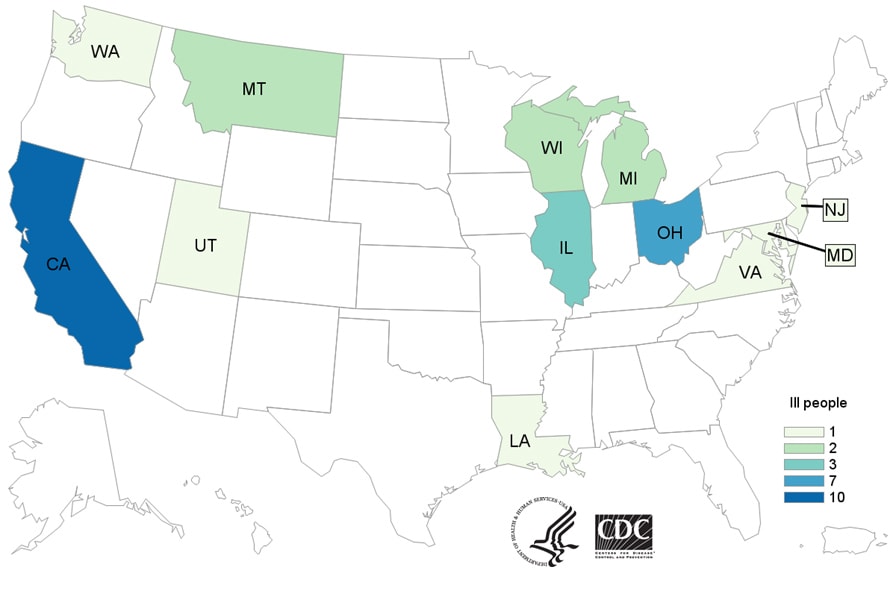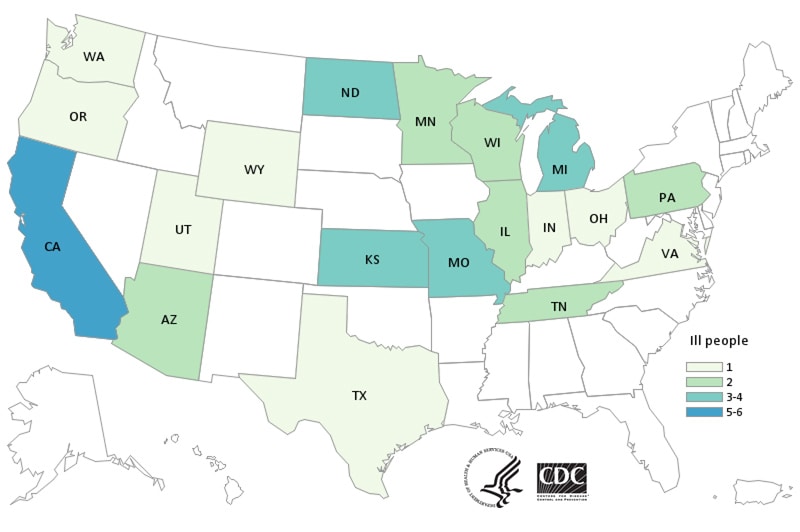As of November 9, 2020, the Michigan Department of Agriculture and Rural Development (MDARD) advised consumers to not consume Tanimura & Antle brand romaine lettuce. When this lettuce was randomly tested from a Walmart in Comstock Park, MI, the sample showed that it had been contaminated with E. coli O157:H7. The Michigan Department of Health and Human Services laboratory continued to test this product and confirmed that it was positive for a strain of E. coli genetically similar to E. coli causing two recent illnesses in Michigan.
In total, 18 people were infected with the outbreak strain of E.coli O157:H7, in 9 states. The illness began on September 2, 2020 and continued until November 6, 2020. Six people were hospitalized, no deaths were reported.
Of the 13 people interviewed, all reported eating various leafy greens, including romaine lettuce (9), spinach (9), and iceberg lettuce (7). Laboratory testing identified the outbreak strain in a sample of Tanimura & Antle romaine lettuce in a single-head package; it was recalled on November 6, 2020. None of those interviewed reported eating Tanimura & Antle romaine lettuce, and some became ill prior to the "packed on" dates for the recalled products.
The FDA conducted traceback investigations and worked with state officials to inspect several farms. However, none of their findings determined with certainty a common source of the tainted product. There was inadequate information for investigators to identify the likely source in the distribution chain or link the farms to the outbreak. As of December 18, 2020 this outbreak is over.
Two additional investigations into E.coli tainted lettuce.
As of October 28, 2020, the FDA, CDC and local and state health officials were investigating two different E. coli O157:H7 outbreaks that are recurring, emerging, or persistent strains of this pathogen. In order to rule out foods that may be contaminated. The epidemiological and traceback investigation was a coordinated effort between different agencies, with on-site inspections and sampling being conducted to help determine more specific conclusions.
In the first outbreak, a total of 32 people were infected with E. coli O157:H7 which was reported in twelve states. Illnesses began on June 6, 2020, to October 25, 2020. Ill people ranged in age from 2 to 75 years, with a median age of 27 years, with 72% percent of those ill being female. Of 16 ill people with information available, 15 hospitalizations have been reported, including 1 person who developed hemolytic uremic syndrome (HUS), a type of kidney failure. One death has been reported from Michigan.
People infected with the outbreak strain of E. coli O157:H7, by state of residence, as of December 16, 2020 (n=32)

When those who became ill were interviewed, they reported eating at the same restaurant and had eaten multiple common foods. However, after the CDC analyzed the interview data, they were unable to identify a specific food item that could have been the cause of the outbreak. In addition, the FDA did traceback investigations for several of the food items served at the restaurant and were also unable to positively identify a common source in the distribution chain. This investigation is complete as there was not enough information to determine a likely source.
In the second outbreak, a total of 40 people were sickened with E.coli O157:H7 in 19 states. Illnesses started on August 10, 2020, and continued until October 31, 2020. Of those ill, 60% percent were female, with ages ranging from 1 to 85 years. Twenty people were hospitalized, with 4 developing hemolytic uremic syndrome (HUS), a failure of the kidneys. No deaths were reported.
People infected with the outbreak strain of E. coli O157:H7, by state of residence, as of December 18, 2020 (n=40)

Of the 23 ill people interviewed in this outbreak, 22 reported eating a variety of leafy greens including spinach (16) and romaine lettuce (15). Traceback investigations conducted by the FDA and public health officials led to several leafy green farms. They collected environmental samples and conducted inspections of the farms. However, no single farm was identified as the common source of the leafy greens. The FDA is analyzing the samples and continuing their investigations to identify the source of this E.coli outbreak.
Marler Clark, The Food Safety Law Firm, is the nation’s leading law firm representing victims of E. coli outbreaks and hemolytic uremic syndrome (HUS). The E. coli lawyers of Marler Clark have represented thousands of victims of E. coli and other foodborne illness infections and have recovered over $700 million for clients in the last 25 years. Marler Clark is the only law firm in the nation with a practice focused exclusively on foodborne illness litigation. Our E. coli lawyers have litigated E. coli and HUS cases stemming from outbreaks traced to ground beef, raw milk, lettuce, spinach, sprouts, and other food products. The law firm has brought E. coli lawsuits against such companies as Jack in the Box, Dole, ConAgra, Cargill, and Jimmy John’s. We have proudly represented such victims as Brianne Kiner, Stephanie Smith and Linda Rivera.
Managing partner, Bill Marler, began litigating foodborne illness cases in 1993, when he represented Brianne Kiner, the most seriously injured survivor of the historic Jack in the Box E. coli O157:H7 outbreak, in her landmark $15.6 million settlement with the company. The 2011 book, Poisoned: The True Story of the Deadly E. coli Outbreak that Changed the Way Americans Eat, by best-selling author Jeff Benedict, chronicles the Jack in the Box outbreak and the rise of Bill Marler as a food safety attorney.